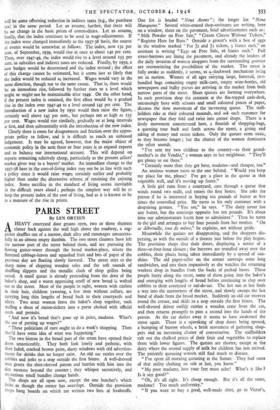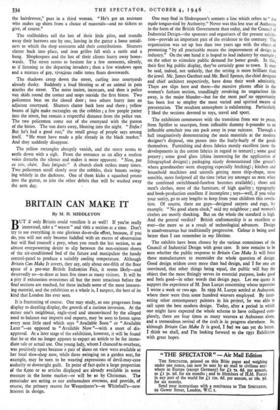PARIS STREET
By LEN ORTZEN
AHEAVY courtyard door groans open, two or three shutters clatter back against the wall high above the roadway, a rag- picker shuffles out of a narrow, dark alley and rummages unsuccess- fully in an almost empty dustbin. The two street cleaners have left the narrow part of the street behind them, and are pursuing the flowing gutter-water through the broad market-place, where the flattened cabbage-leaves and squashed fruit and bits of paper of the previous day are floating slowly forward. The street stirs to the sharp noise of clopping wooden soles and the soft sounds of shuffling slippers and the metallic clash of shop grilles being raised. A small queue is already protruding from the door of the baker's shop, and a warm appetising smell of new bread is wafted out to the street. Most of the people in sight, women with curlers in their hair, children yawning, a few men without collars, are carrying long thin lengths of bread back to their courtyards and alleys. Two stout women leave the baker's shop together, each stuffing a sheet of ration-tickets into a purse choked with official cards and permits.
"And now it's bread that's gone up in price, madame. What's the use of putting up wages?"
"These politicians of ours ought to do a week's shopping. Then they'd have some idea of what was happening."
The two bistros in the broad part of the street have opened their doors unnoticeably. They both look lonely and pathetic, with their faded, cracked brown paint, dusty windows with old advertise- ments for drinks that no longer exist. An old car rattles over the cobbles and jerks to a stop outside the first bistro. A well-dressed man greets the shirt-sleeved patron and hurries with him into the dim recesses beyond the counter ; they whisper secretively, and mysterious small bundles change hands. The shops are all open now, except the one butcher's which looks as though the owner has overslept. Outside the provision shops hang boards on which are written two lists of foodstuffs.
One list is headed "Nous Avons"; the longer list "Nous Manquons." Several white-coated shop-assistants are writing, here on a window, there on the pavement, brief advertisements such as: " Milk Powder on Free Sale," " Cream Cheese Without Tickets," " Register Here for Rum." Outside a grocer's with a box of eggs in the window marked " For J2 and J3 tickets, 5 francs each," an assistant is writing "Eggs on Free Sale, 16 francs each." Full street-barrows are lining the pavement, and already the leaders of the daily invasion of women shoppers from the surrounding quartier are reconnoitring the possibilities of the market. The street is fully awake as suddenly, it seems, as a.-clockwork mechanism being set in motion. Women of all ages carrying large, battered, two- handled bags containing empty milk-cans, empty wine-bottles, old newspapers and bulky purses are arriving in the market from both narrow parts of the street. Short queues are forming everywhere. In each provision shop the assistant at the flat-topped cash-desk, unceasingly busy with scissors and small coloured pieces of paper, dictates the slow movement of the increasing queue. The stall- holders rake at their coloured mounds, and ask each customer for newspaper that they fold and twist into cornet shape. There is a lively movement concentrated here, a flourish of shopping-bags, a questing tour back and forth across the street, a giving and taking of money and ration tickets. Only the queues seem static, as they become longer ; but the chatter of the women dominates the other sounds.
" I've sent my two children to the country—to their grand- mother's in the Vendee," a woman says to her neighbour. "They'll get plenty to eat there."
" Certainly more than they get here, madame—and cheaper, too."
An anxious woman turns to the one behind. " Would you keep my place for me, please? I've got a place in the queue at that vegetable stall, and it's moving up faster."
A little girl runs from a courtyard, cuts through a queue that winds round two stalls, and enters the first bistro. She asks the patron if he is interested in buying ten pounds of butter at five times the controlled price. He turns to his only customer with a despairing gesture. " You see," he says. " The dairy never has any butter, but the concierge opposite has ten pounds. It's about time our administrators learnt how to administer." Then he turns to the girl and arranges to buy four pounds from her mother. "On se debrouille, tout de mime," he explains, not without pride.
Meanwhile the queues are disappearing, and the shoppers dis- persing, as with the outside of a theatre just before the play begins. The provision shops shut their doors, displaying a notice of a three-or-four-hour closure ; the barrows are trundled away over the cobbles, their places being taken immediately by a spread of sun- shine. The old paper-seller on the corner unwraps some long sandwiches, and eats them impassively as she watches the returning workers drop in bundles from the backs of packed buses. These people hurry along the street, some of them going into the baker's and emerging with lengths of bread before continuing to clop over cobbles to their courtyard or cul-de-sac. The hot sun at last finds a way into the narrowness of the street, and slowly sweeps the last band of shade from the broad market. Suddenly an old car swerves round the corner, and skids to a stop outside the first bistro. The well-dressed driver swiftly carries a wooden crate from the car, and then returns promptly to pass a second into the hands of the patron. As the car dashes away it seems to have awakened the street again. There is a squeaking of shop doors being opened, a bumping of barrow wheels, a brisk movement of gathering shop- pers and an increasing chatter of conversation. The stallholders rub out the chalked prices of their fruit and vegetables to replace them with lower figures. The queues are shorter, except at the dairy where the second supply of milk for children has just arrived. The patiently queueing women still find much to discuss.
" I've spent all morning queueing at the Samar. They had some of that utility clothing on sale at last, you know."
"My poor madame, how your feet must ache! What's it like ? Is it any good?"
" Oh, it's all right. It's cheap enough. But it's all the same, madame! Too much uniformity."
" If you want to buy a good, well-made shirt, go to Victor's, the hairdresser," puts in a third woman. " He's got an assistant who makes up shirts from a choice of materials—and no tickets to give, of course."
The stallholders sell the last of their little piles, and trundle away their barrows one by one, leaving in the gutter a loose untidi- ness to which the shop assistants add their contributions. Shutters clatter back into place, and iron grilles fall with a rattle and a bang. Shopkeepers and the last of their clients hurry away home- wards. The street seems to hesitate for a few moments, silently, as if listening to the departing invaders ; then a few windows open and a mixture of gay, vivapions radio tunes floats downwards.
The shadows creep down the street, curling into courtyards already dusky. Suddenly a loud bleating as of an animal in pain startles the street. The noise insists, increases, and then a police van skids round the corner and stops outside the first bistro. Two policemen beat on the closed door ; two others hurry into an adjacent courtyard. Shutters clatter back here and there ; yellow beams of light make rectangles on the cobbles ; a few people patter into the street, but remain a respectful distance from the police van. The two policemen come out of the courtyard with the patron of the bistro. The van darts away, bleating into the night. "Enfin I But he's had a good run," the small group of people says among itself. "He must have made a pile already in the black market." And they suddenly disappear.
The yellow rectangles abruptly vanish, and the street seems to settle down with a sigh. From the entrance to an alley a restless voice disturbs the silence and makes it more apparent. "Non, pas ce soir, cheri. Suis fatiguee." A church clock strikes many times. Two policemen stroll slowly over the cobbles, their batons swing- ing whitely in the darkness. One of them kicks a squashed potato into the gutter, to join the other debris that will be washed away the next day.































 Previous page
Previous page